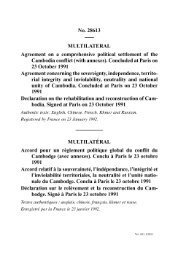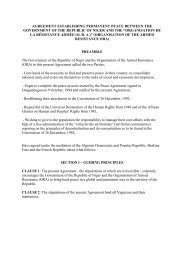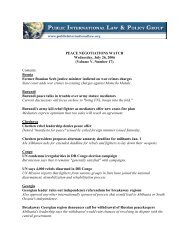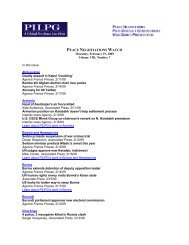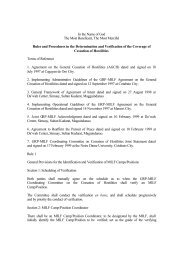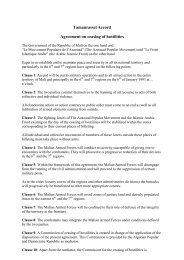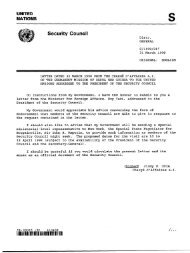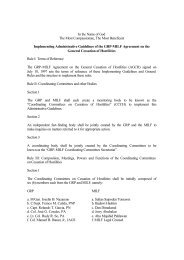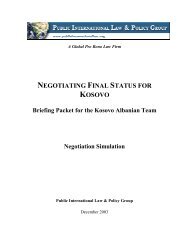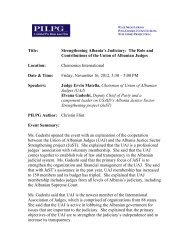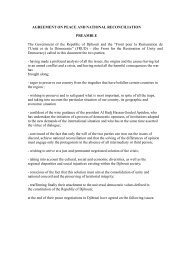You also want an ePaper? Increase the reach of your titles
YUMPU automatically turns print PDFs into web optimized ePapers that Google loves.
18<br />
community continue to be under the control of Belgrade and the local Serb population.<br />
Belgrade directs and pays local officials in the north. The "bridge-watchers" continue to<br />
operate in Mitrovica, despite the long-awaited arrest by the international community of<br />
one of their number. Oliver Ivanovic lost control of the bridge watchers in the summer of<br />
2000 and it now seems most likely that they report directly to police or party backers in<br />
Belgrade although I was not able to spend much time on this question during my week in<br />
Kosovo.<br />
There is little evidence of any strategy on the part of the international mission for<br />
overcoming the division of Mitrovica or for taking back control of the north from<br />
Belgrade and the local Serbs. The opening of an international office in northern<br />
Mitrovica, intended to provide government services to the Serb population, as similar<br />
offices do in the Serb enclaves in the southern part of Kosovo, led to riots and a complete<br />
boycott by the local population, which still recognizes Belgrade's officials as the<br />
legitimate authorities in the north despite the incompatibility of this presence with UNSC<br />
1244. The international mission reportedly plans to open a joint market along the<br />
Mitrovica dividing line, where Serbs and Albanians can meet under KFOR guard. This<br />
could be a modest step toward increasing contacts but if it happens it would come almost<br />
two years after former U.S. Administrator William Nash recommended taking such a<br />
step.<br />
Organized Crime<br />
Many internationals point to the police as an area of success for the international mission<br />
and to some extent this evaluation seems accurate. According to the UN, the rate in<br />
which crime cases are solved is increasing. There are currently over 4,500 UN police in<br />
Kosovo and about 4,000 members of the local, internationally trained and supervised<br />
Kosovo Police Force (KPS).<br />
A senior international police official told me that he thought the international police force<br />
had done about as well as could be expected but he also outlined several problems. He<br />
thought that perhaps only half of the UN police officers in Kosovo worked effectively<br />
and that many UN police officers did not give a good example to the KPS they were<br />
supposed to be training. (Comment: This confirms what Kosovars say and what even a<br />
casual visitor to Kosovo can see with his own eyes. Basically, only the U.S., Canadian,<br />
and some Western European police attempt to carry out their duties in what we would<br />
regard as a serious fashion—and even they seem to spend more time in cafes than they<br />
probably would on the job at home. Third World police—perhaps, to be fair, reflecting<br />
the way they operate at home—do little in the way of active policing and seem to prefer<br />
driving around in vehicles or swaggering about town in large, heavily armed groups. (A<br />
Kosovo Albanian political leader told me that his people had monitored the activities of<br />
the UN police in Pec, where the local chief of UN police was a Russian and 70 percent of<br />
the UN police were from the former Soviet Union. He described the police there as<br />
deeply corrupt and engaging in a wide range of criminal activities. He claimed he had<br />
presented this evidence to the UN but it had been ignored.)




